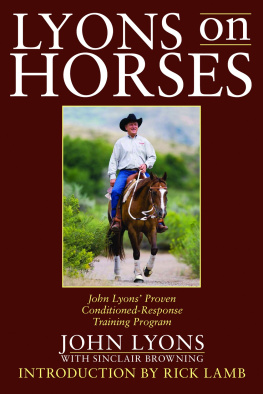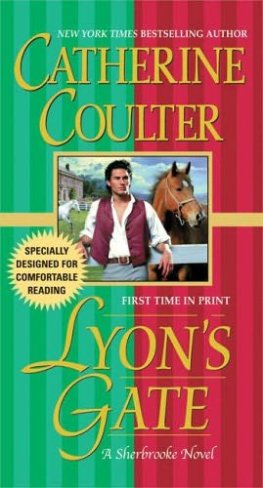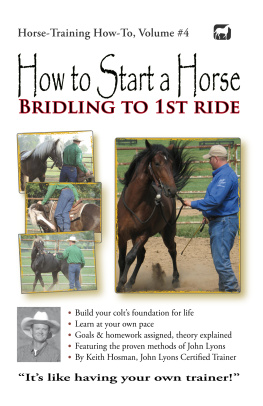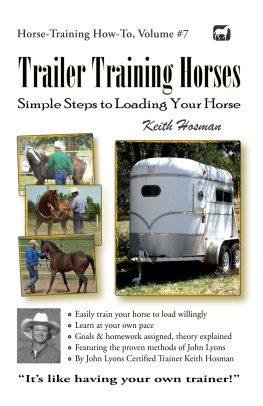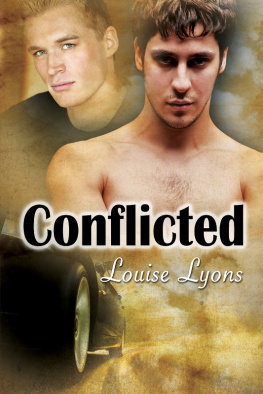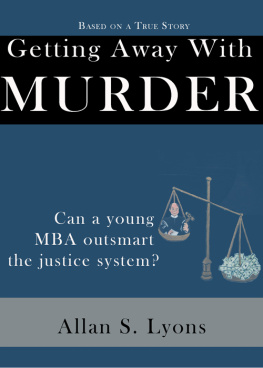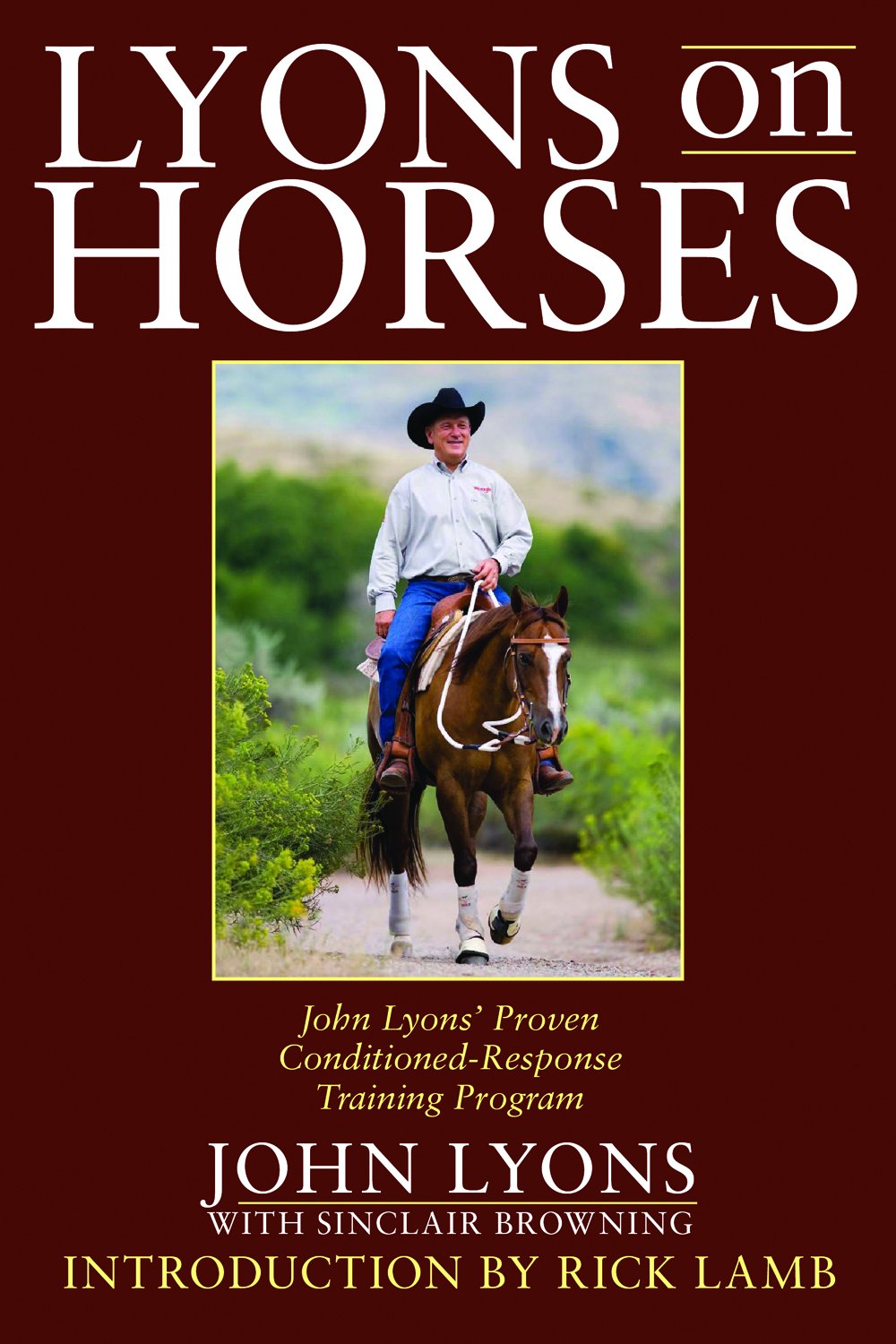Afterword
I n the beginning of this book, we talked about the importance of defining a problem specifically. Weve broken down each problem into a series of small steps, or segment-goals, and worked on each of them in a progressive manner. By setting up a condition and getting a response, weve not only reached our goals, but we now have a horse who is truly a partner.
The last ten years have been fun. Theyve been filled with a lot of traveling, a lot of teaching and learning, and weve met a lot of nice people along the way. Since those long-ago neighborhood clinics, our program has grown into two-day symposia at horse facilities in major cities across the United States. My hat goes off to all of you who have made this possible.
A special thanks must go to my wife, Susie. She has stood behind me, loved me, and supported me through good times and lean, believing in me every step of the way. Many a midnight before a program would find her on a ladder, hammer in hand, tacking up one last poster for a John Lyons Symposium.
But Susie and I have a special friend who has always been there for us, and Id like to share with you the important role He has had in our lives.
When we started in the clinics, we were at a financial crossroads in our lives. We were struggling with the ranch, which we loved, but the economic prospects for continuing were pretty grim. We had the idea for the clinics, but we both knew that it would take time before they would support us. Also, if they were successful, it would mean that I would be gone from home a great deal of the time.
We decided to do our best to turn our lives, and the business, over to God and let Him direct us.
I can honestly tell you that there were many times when we didnt have enough money to buy gas to go to the next clinic. En route, Id call the host, and he or she would tell me there werent any horses signed up. Many times it looked as though there was just no way we could continue. But then we would both pray for Gods help, and He never let us down. He continually saw us through those rough times.
Quite often at night, while on the road, Id reread comments from symposium participants over and over, and these folks would keep saying to me that there was a need, and that God was involved with us.
God has stood by me and my family. I cant begin to tell you of all the miracles He has done for us. While I am by no means the best example of a Christian, I wanted to take this opportunity to tell you all that I believe with all of my heart that God is real, and that He will help you with your everyday lives, just as He has helped us with ours.
Finally, thanks to all of you who have had the patience and interest to sit down and read Lyons on Horses . Good luck to you in your training.
God bless and keep you.
John Lyons
Chapter One
My Philosophy on Horses
I want my horse to be my partner. To me, that means someone who helps me, who isnt a nuisance, and who makes my job easier. Someone I can trust and who trusts me; someone I dont have to force to do something.
In order to have a true partner, I have to let go of him and trust him. As I let go I have to understand that hes going to make mistakes. I dont need to reprimand my horse for his mistakes, instead I need to show him why I want him to do certain things. I know that if I can avoid fights with him, Ill end up with a better partner.
In many ways, dealing with horses is a lot like dealing with kids. There are times when in order to teach them you simply have to let go. For instance, a lot of people want their horses to stand by them or to follow them, but they never let go of the reins. If they do and the horse walks off, theyre inclined to think, What a dumb horse; he has to be tied up! If I let go of my horse and he takes off, I think, Im a lousy teacher. His walking off tells me I need to teach him more in order for him to stay with me.
If I cant get my horse to overcome a problem, its my lack of knowledge, not the horse that is at fault. If I cant get him to load in a trailer, its not because his eyesight is bad, or that his mother was an Appaloosa, or that hes having a bad day, its because I havent taught him right.
If you see a problem in a horse, or a training area in which he needs improvement, dont ignore it. For instance, if you have a head-shy horse you know that overcoming this problem is a priority before you attempt to mount him. If you dont correct the problem, you run the risk of being injured or even killed if you accidentally get close to his head. In such cases ask yourself which training problem comes first.
If the horse is afraid of being tied, you need to take care of that problem before you put him in a cross tie. If you take him to a horse show, someone who doesnt know better might tie him, and while youre off collecting your ribbon, hes causing a major wreck. Suddenly things that dont seem so important can become terribly important.
I dont care what the horse has done before or whats happened to him. From here on out well deal with today only. We cant change the fact that someone may have hit the horse over the head five thousand times, or that little kids may have thrown rocks at him. There is no way any of us can change what has already happened, so its futile to spend any time thinking about the horses past experiences. Its his problem now thats important, not the history of the problem. Sometimes we get so involved with that history that we cant concentrate on correcting the problem.
The past can also cloud our thinking as we begin making excuses for the horses poor conduct, rather than asking the horse to change his behavior.
The horse is a very adaptable animal. He is fully capable of changing his behavioral patterns, especially if he is given time to make his own decisions.
I personally dont believe any horse is either vicious or beyond being able to be trained.
Horses are never too old to learn or to change bad habits. The good thing about a horse is that whatever behavior wed like to change, we can. We dont have to accept any behavior from the horse that we do not like. We just have to concentrate twice as hard on training him to do those things we want to, to get him to change.
A woman came to one of my symposia and said she had waited two years before trying to change her horses behavior, because she didnt want to do the wrong thing. Dont be afraid of making a mistake with your horse. We all do. And were all forgiven. The biggest mistake is to succeed at doing nothing.
The bad thing about a horse is that everything I like about him today probably wont always be there, unless I continue to practice the things the horse is doing that I like. I also never want to lose sight of the fact that my horse is always learning.
You must decide what it is you want your horse to do. Obviously some breeds do certain tasks more gracefully than others. A draft horse or a Thoroughbred can do a sliding stop, but neither does it as prettily, or holds it as long, as a horse that has been bred to do it. My point is that all horses are capable, to some degree, of jumping, sliding stops, barrel racing, trail riding, or any other task you wish them to perform.
PREJUDICE, AN UGLY CONCEPT
Prejudice is ugly in any form. There is not one breed of horses that is better than all others, or one best breed. Each has been bred for specific characteristics. A Paso Fino is not bred to pull a heavy wagon, few draft horses compete in calf roping, and a Quarter Horse is not designed to run a hundred-mile race. But there are more differences within a breed, than between breeds.

